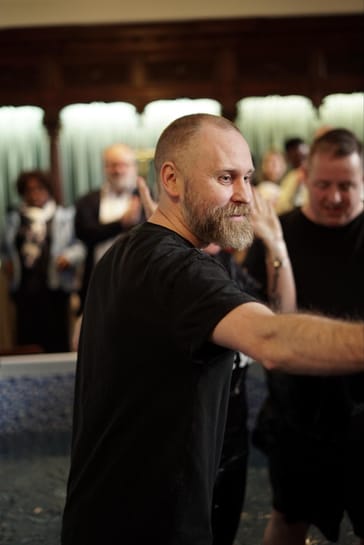Genesis 11:10-32
10 This is the account of Shem’s family.
Two years after the great flood, when Shem was 100 years old, he became the father of[c] Arphaxad. 11 After the birth of[d] Arphaxad, Shem lived another 500 years and had other sons and daughters.
12 When Arphaxad was 35 years old, he became the father of Shelah. 13 After the birth of Shelah, Arphaxad lived another 403 years and had other sons and daughters.[e]
14 When Shelah was 30 years old, he became the father of Eber. 15 After the birth of Eber, Shelah lived another 403 years and had other sons and daughters.
16 When Eber was 34 years old, he became the father of Peleg. 17 After the birth of Peleg, Eber lived another 430 years and had other sons and daughters.
18 When Peleg was 30 years old, he became the father of Reu. 19 After the birth of Reu, Peleg lived another 209 years and had other sons and daughters.
20 When Reu was 32 years old, he became the father of Serug. 21 After the birth of Serug, Reu lived another 207 years and had other sons and daughters.
22 When Serug was 30 years old, he became the father of Nahor. 23 After the birth of Nahor, Serug lived another 200 years and had other sons and daughters.
24 When Nahor was 29 years old, he became the father of Terah. 25 After the birth of Terah, Nahor lived another 119 years and had other sons and daughters.
26 After Terah was 70 years old, he became the father of Abram, Nahor, and Haran.
The Family of Terah
27 This is the account of Terah’s family. Terah was the father of Abram, Nahor, and Haran; and Haran was the father of Lot. 28 But Haran died in Ur of the Chaldeans, the land of his birth, while his father, Terah, was still living.29 Meanwhile, Abram and Nahor both married. The name of Abram’s wife was Sarai, and the name of Nahor’s wife was Milcah. (Milcah and her sister Iscah were daughters of Nahor’s brother Haran.) 30 But Sarai was unable to become pregnant and had no children.
31 One day Terah took his son Abram, his daughter-in-law Sarai (his son Abram’s wife), and his grandson Lot (his son Haran’s child) and moved away from Ur of the Chaldeans. He was headed for the land of Canaan, but they stopped at Haran and settled there. 32 Terah lived for 205 years[f] and died while still in Haran.
Terah was Abram’s father and he was headed to Canaan. This was the very place that Abram will be called to head to by God in the next chapter. It will be the promised land of the Jews and Terah is heading there. However, he stops in a place called Harán. Places were normally named after their features and Harán means rocky place. Terah got to a rocky place and stopped his journey. Perhaps he was tired, perhaps he gave up, perhaps he liked it there, we do not know. However, I wonder if the story of scripture would have been totally different if he had continued. Would Terah have been the forefather of Israel?
God has a call for your life, however, it always sits on the other side of a rocky place. So many people take a step of faith and then are surprised when it is not all rainbows and sunshine. They end up stopping at the rocky place and not continuing their journey. God will not stop you if you do not want to continue, however, his plans will be fulfilled through someone else.
A lot of the time I think that God uses the people who are the strongest, the smartest or the holiest. However, I have come to believe that the people God uses are those who persevere. Those who do not turn away when they hit the rocky place. Those who see the battles coming and keep moving forwards.


